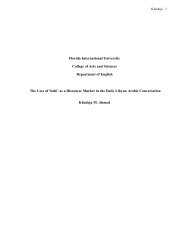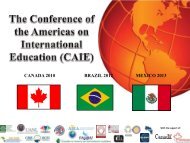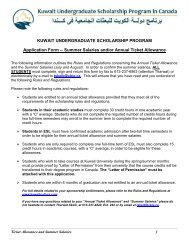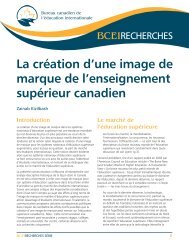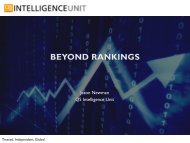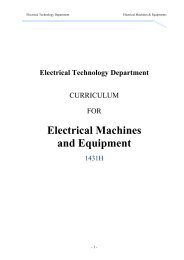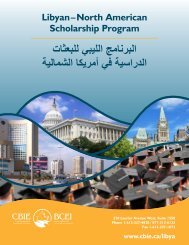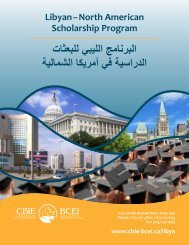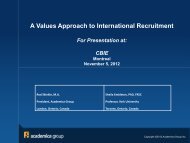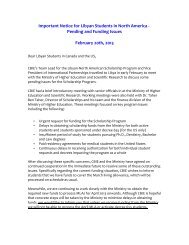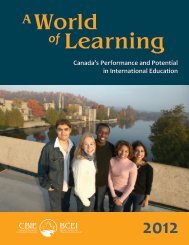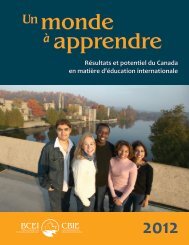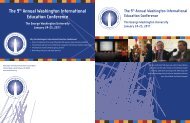Creating a New Historical Perspective: EU and the Wider World ...
Creating a New Historical Perspective: EU and the Wider World ...
Creating a New Historical Perspective: EU and the Wider World ...
Create successful ePaper yourself
Turn your PDF publications into a flip-book with our unique Google optimized e-Paper software.
often used in history studies except as a tool for underst<strong>and</strong>ing <strong>the</strong> initial level of<br />
student knowledge at <strong>the</strong> beginning of a course unit or study programme.<br />
In some systems oral exams are used more commonly than written ones, or even<br />
exclusively.<br />
Students may be asked or required to present written or oral reports based on<br />
specific reading assignments or circumscribed research tasks. The reports are assessed<br />
<strong>and</strong> <strong>the</strong> assessment usually is taken into consideration in <strong>the</strong> final grade or<br />
mark for <strong>the</strong> course unit. In some cases <strong>the</strong> entire course work may consist of one<br />
or more oral or written reports <strong>and</strong> <strong>the</strong> assessment hence constitutes <strong>the</strong> final<br />
result in its entirety. In some traditions reports have a codified scheme according<br />
to which <strong>the</strong> argument must be treated (France); in o<strong>the</strong>r countries <strong>the</strong> form is<br />
freer (usually <strong>the</strong> approximate length is specified), although general indications<br />
about form may be given. The reports are judged by <strong>the</strong> interest <strong>and</strong> accuracy of<br />
<strong>the</strong> contents <strong>and</strong> usually on <strong>the</strong> basis of clarity, efficacy <strong>and</strong> correctness of expression,<br />
although <strong>the</strong>se criteria may not be stated.<br />
Classroom discussion/participation: in many of <strong>the</strong> ‘teaching formats’ identified<br />
under point 2, students are encouraged, asked or expected to enter into discussion,<br />
asking questions, formulating comments or giving information. The<br />
discussion styles in different countries (<strong>and</strong> even with different teachers) are<br />
markedly varied. In some instances, performance in discussion is taken into account<br />
in a precise way; in o<strong>the</strong>rs assessment of discussion is only used as a general<br />
indicator of <strong>the</strong> interest <strong>and</strong> preparation of <strong>the</strong> student, to integrate <strong>the</strong><br />
results of exams or reports; in still o<strong>the</strong>rs, assessment based on performance<br />
in classroom discussion is specifically avoided, in order to encourage students<br />
to express <strong>the</strong>mselves freely <strong>and</strong> to use <strong>the</strong> discussion in a non-prescriptive,<br />
unstilted, brain-storming style.<br />
As mentioned above, a very significant method of both learning/teaching <strong>and</strong><br />
assessment is based on <strong>the</strong>ses, dissertations or research papers. As this method is<br />
central to <strong>the</strong> subject area, we examine it briefly as a separate point, here below.<br />
5. Theses, dissertations <strong>and</strong> research papers<br />
For some first cycle students, most second <strong>and</strong>, particularly, all third cycle students<br />
in <strong>the</strong> field of History, <strong>the</strong> written research <strong>the</strong>sis or dissertation has a<br />
fundamental role both in learning/teaching <strong>and</strong> in assessment. The production<br />
of such a piece of work constitutes an important phase for <strong>the</strong> learner, who must<br />
36



